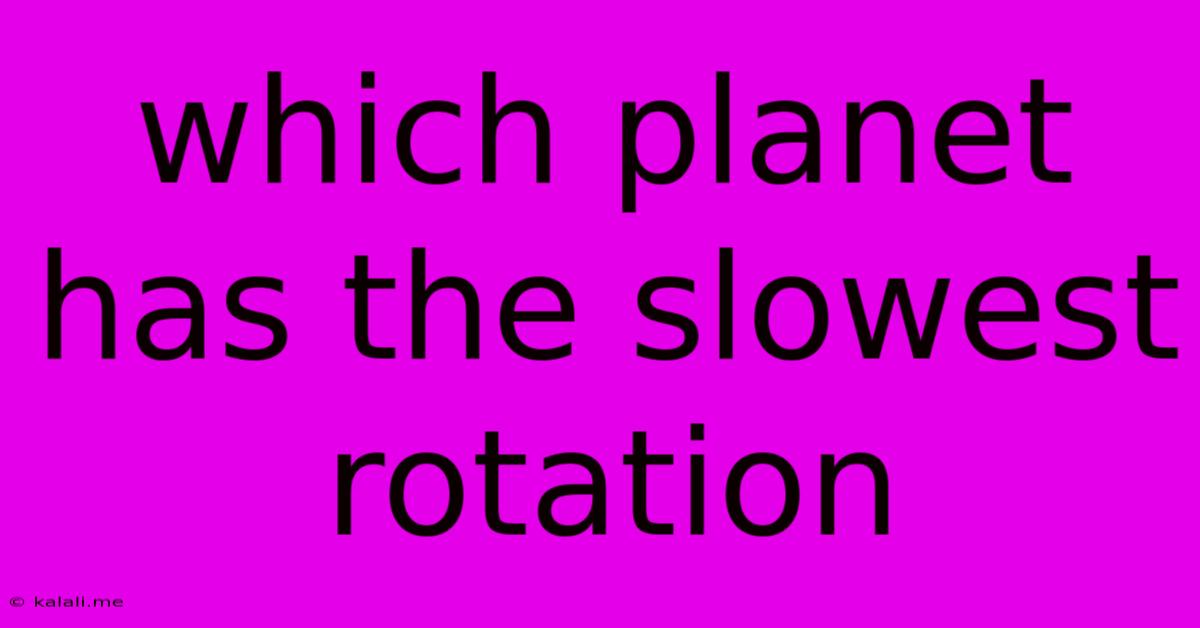Which Planet Has The Slowest Rotation
Kalali
Jun 15, 2025 · 3 min read

Table of Contents
Which Planet Has the Slowest Rotation? Unveiling the Sluggish Spin of Venus
Ever wondered which planet takes the longest to complete a single rotation on its axis? The answer might surprise you. While many might guess it's one of the gas giants far from the sun, the planet with the slowest rotation is actually Venus. This article delves into the fascinating reasons behind Venus's incredibly slow spin and compares it to other planets in our solar system.
Venus boasts a remarkably slow rotational period, taking approximately 243 Earth days to complete a single rotation. That's longer than its orbital period around the sun, which is around 225 Earth days. This means a day on Venus is longer than a year on Venus! This unusual characteristic sets it apart from all other planets in our solar system.
Why is Venus's Rotation So Slow?
The exact reason for Venus's sluggish spin remains a topic of scientific debate. However, the leading theory suggests a colossal impact early in the planet's history played a significant role. This massive collision could have dramatically altered Venus's rotational speed and even reversed its direction. The impact hypothesis proposes that a large celestial body struck Venus, drastically slowing its rotation and potentially causing it to spin retrograde – opposite to the direction of most other planets in our solar system.
Another factor contributing to the slow rotation might be related to tidal forces from the sun. While less significant than the impact theory, the sun's gravitational pull could have gradually slowed Venus's spin over billions of years. This process is similar to how the Moon's gravity affects Earth's tides and gradually slows Earth's rotation. However, the impact theory remains the most widely accepted explanation for Venus's unique rotational properties.
Comparing Venus's Rotation to Other Planets
Let's compare Venus's rotational period to other planets in our solar system to put its slow spin into perspective:
- Earth: 24 hours
- Mars: 24.6 hours
- Jupiter: 9.9 hours
- Saturn: 10.7 hours
- Uranus: 17.2 hours
- Neptune: 16.1 hours
As you can see, Venus's rotational period significantly dwarfs that of all other planets. This incredibly slow rotation contributes to the extreme surface temperatures and atmospheric conditions found on Venus.
The Significance of Venus's Slow Rotation
Understanding the reasons behind Venus's slow rotation is crucial for planetary science. It helps scientists learn more about the formation and evolution of planetary systems, the effects of giant impacts, and the long-term influences of tidal forces. Further research into Venus's rotation will provide valuable insights into the dynamics of planetary bodies and the processes that shape their characteristics. The ongoing study of Venus helps us better understand the broader context of our solar system and the formation of planets in general. This unique planetary characteristic continues to intrigue and challenge scientists, pushing the boundaries of our understanding of planetary dynamics. Further exploration and research are essential to unravel the mysteries surrounding Venus’s extraordinary slow rotation.
Latest Posts
Latest Posts
-
What Are Blocks In Periodic Table
Jun 16, 2025
-
Lock A Value In Excel Formula
Jun 16, 2025
-
Which Number Is Twice The Sum Of Its Digits
Jun 16, 2025
-
What Are All The Factors Of 13
Jun 16, 2025
-
Which Of The Following Electromagnetic Waves Have The Highest Frequencies
Jun 16, 2025
Related Post
Thank you for visiting our website which covers about Which Planet Has The Slowest Rotation . We hope the information provided has been useful to you. Feel free to contact us if you have any questions or need further assistance. See you next time and don't miss to bookmark.